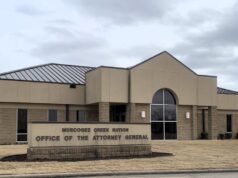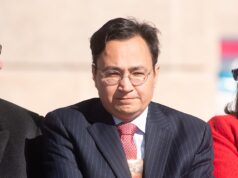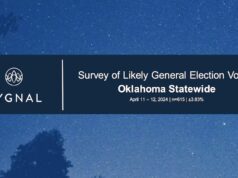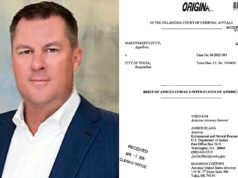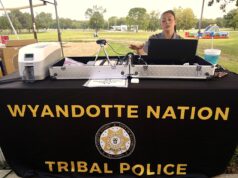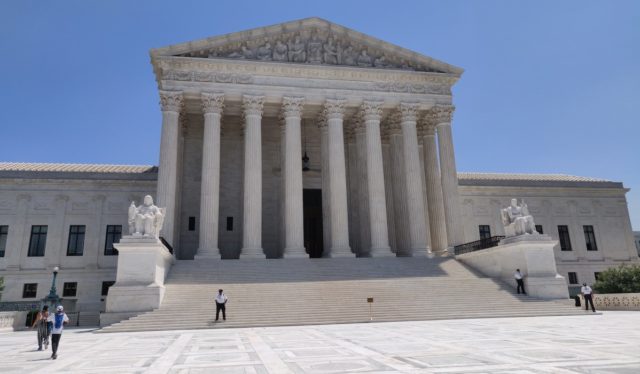
In more than two hours of oral arguments regarding Oklahoma v. Castro-Huerta on Wednesday morning, the justices of the U.S. Supreme Court probed the legal consequences and practical implications of granting the state jurisdiction in crimes committed against Indians by non-tribal citizens in Indian Country.
A full audio recording and a transcript of the arguments are available online.
The formerly reticent Justice Clarence Thomas asked the first question of the proceedings by inquiring about a basic circumstance underlying the case. He asked Kannon Shanmugam, a contracted attorney representing the state, why this jurisdictional issue was arising only now, when reservations have been around for a long time.
Shanmugam explained that the Supreme Court’s 2020 decision on McGirt v. Oklahoma, in which Thomas dissented and which the state’s appeal in Castro-Huerta is designed to challenge, had recognized a large percentage of Oklahoma as Indian Country, and that these issues had not arisen frequently in Oklahoma beforehand.
The hearing then focused largely on two issues. Pressed by justices seemingly critical of the state’s argument, the first issue involved the legal implications of granting Oklahoma’s request that the court recognize state jurisdiction — in addition to federal and tribal jurisdiction — in cases involving Indian victims and non-Indian perpetrators.
Shanmugam argued that the existence of federal and tribal jurisdiction does not preclude continuing state jurisdiction.
“But the thing that has bothered me as I’ve read your brief,” Justice Sonia Sotomayor said to Shanmugam, “is you’re suggesting something much broader than whether this statute preempts state law. You’re suggesting that the federal government doesn’t have the power to preempt state law at all.”
Justice Neil Gorsuch, who wrote the court’s majority opinion in McGirt, pointed to acts of Congress that specifically granted certain states the jurisdiction Oklahoma is requesting. Gorsuch suggested the fact that they were specifically granted this jurisdiction implies that they did not possess it by default.
Shanmugam said he interpreted those acts as intending to “clarify” the state’s existing jurisdiction.
The justices’ questions seemed to fall roughly along the lines of the 5-4 vote in McGirt, with Justices Elena Kagan and Stephen Breyer — who was hearing the final oral argument before his impending retirement — joining Gorsuch and Sotomayor in peppering Shanmugam with critical questions largely to do with the historical and legal relationship between different jurisdictions.
The second topic that received significant attention was the immediate, practical repercussions of the McGirt decision, and the justices who had dissented in McGirt — including Thomas, Justice Samuel Alito and Justice Brett Kavanaugh (Justice Amy Coney Barrett was not yet on the court at that time) — seemed more focused on this question than their colleagues were.
An exception appeared to be Chief Justice John Roberts, who dissented in McGirt but today sounded skeptical of the role that decision played in the state’s current argument.
“Really, at the end of the day, when you’re talking about McGirt, you’re really just waving a bloody shirt,” he said. “It doesn’t have any direct pertinence on the legal analysis here.”
Zachary Schauf represented Victor Castro-Huerta, who was sentenced in 2017 to 35 years in prison for the severe neglect of his 5-year-old step daughter, a citizen of the Eastern Band of Cherokee Indians. The Oklahoma Court of Criminal Appeals vacated his conviction in April 2021 on the basis that, according to the McGirt decision, the case did not fall under state jurisdiction. Castro-Huerta has since pleaded guilty to federal charges for the crime.
Wednesday, Schauf focused his opening argument on precedents he said demonstrated that states did not automatically have jurisdiction in cases such as this one, though he also pointed to an existing legal mechanism through which states can be given that jurisdiction by a vote of tribal members.
Questioned by Thomas whether state and federal jurisdiction would clash in criminal cases, Schauf argued that laws concerning tribal lands were formulated with an understanding that states were “Indians’ deadliest enemies” at the time so federal protection was needed.
“I don’t think you put, you know, the fox in charge of the hen house even if the fox only has concurrent jurisdiction,” Schauf said.
Thomas was dismissive of the argument that state law enforcement would not adequately protect tribal victims, pointing out that Castro-Huerta’s current federal plea deal involves much less prison time than the state sentence that had been vacated because of McGirt.
Kavanaugh pursued a similar line.
“I guess I’m not sure how Indian victims can be harmed by having more prosecutorial authority to fill a gap in Oklahoma where crimes are not being prosecuted against Indian victims, at least now,” he said.
‘An assessment of the situation right now in Oklahoma’
Edwin Kneedler, deputy solicitor general at the Department of Justice, appeared as an amicus curiae in support of Castro-Huerta. Kneedler emphasized the federal government’s position that the state does not have jurisdiction in such cases.
In questioning Kneedler, Alito returned to an argument Oklahoma Gov. Kevin Stitt’s administration has been making about the practical implications of McGirt.
“I think the most valuable information you can provide for me at least is an assessment of the situation right now in Oklahoma and whether the criminal laws are being adequately enforced right now, and whether the current situation in the judgment of the United States is sustainable,” Alito said.
Kneedler acknowledged that there have been challenges in the shift of jurisdiction, but he argued that it is ultimately for Congress and the tribes to find a way to remedy the situation through existing legal mechanisms.
“But I think we have to assume Congress will live up to the responsibilities to enable the Justice Department to do everything that is necessary,” he said.
With the conclusion of Wednesday’s oral arguments, it’s unclear exactly when the justices will make their decision, but it typically takes several weeks for justices to conference and for opinions to be released. The court’s current term runs through the end of June.











